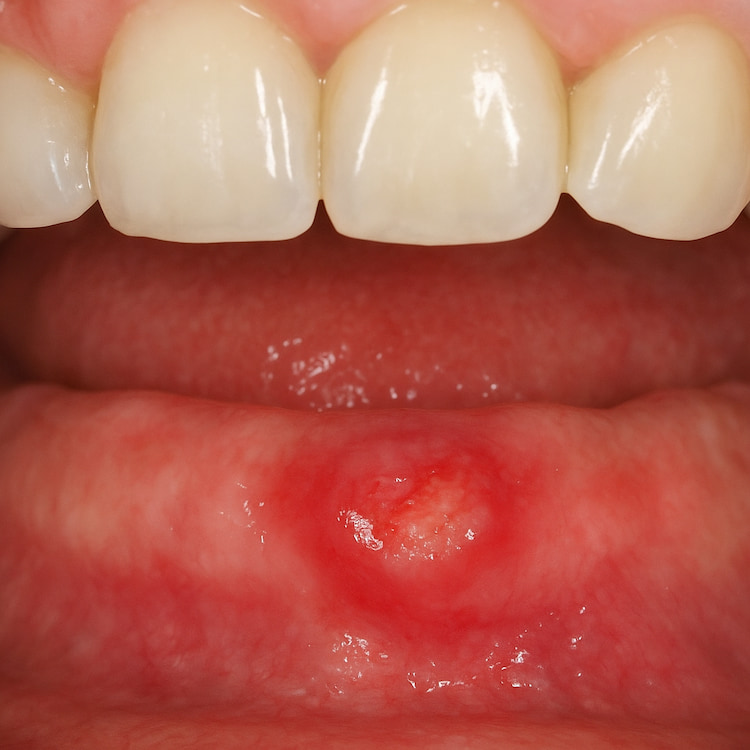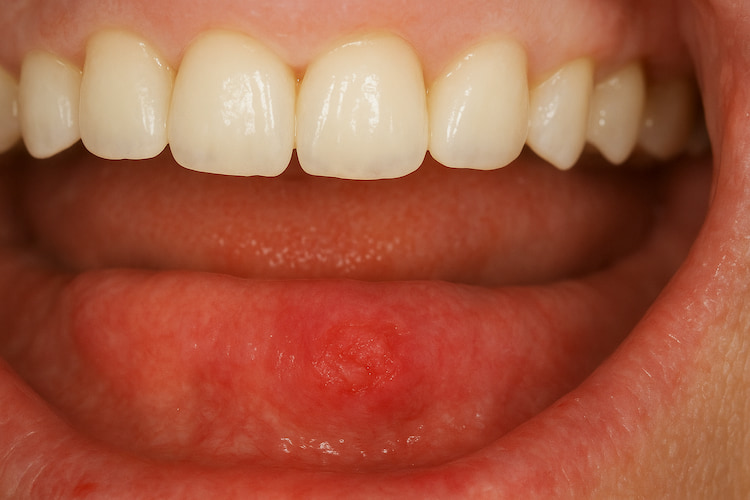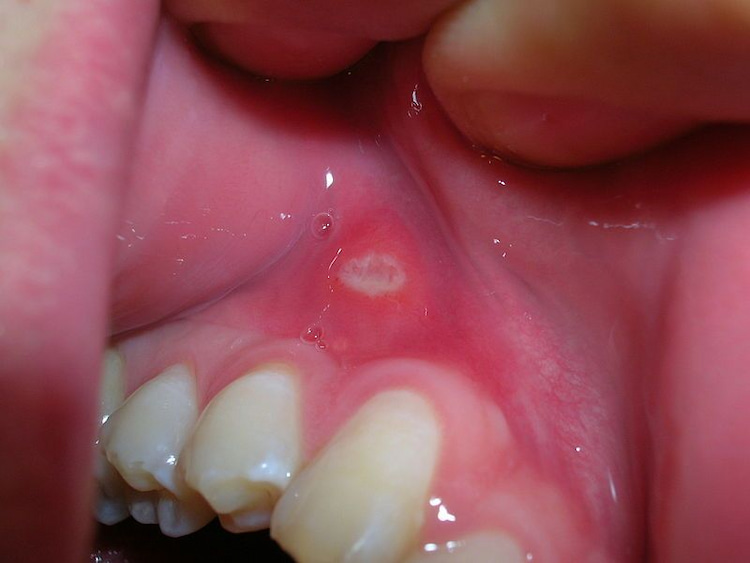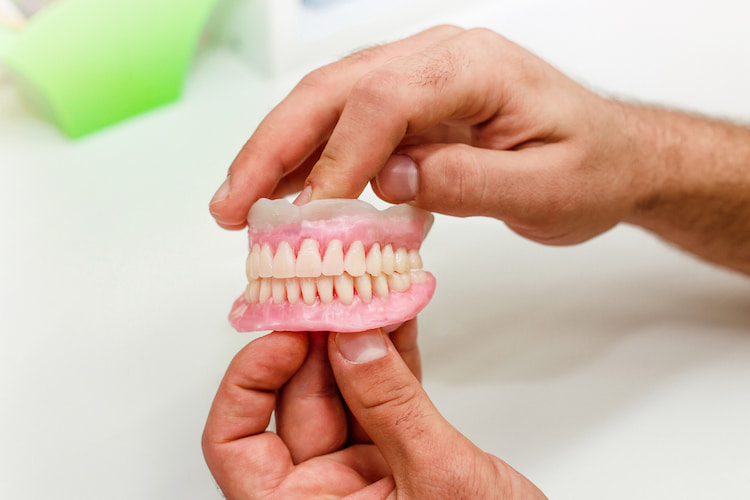Wearing dentures should restore your smile and confidence, not cause discomfort. But if you’re experiencing pain, redness, or sores inside your mouth, you’re not alone. Denture sores (also called denture stomatitis or pressure sores) are a common problem for many denture wearers. They often develop when dentures rub against the gums or don’t fit properly.
In this article, we’ll show you the pictures of denture sores, explain why they happen, and help you understand how to treat and prevent them. Whether you’re new to dentures or have worn them for years, these insights can help you find relief and enjoy your smile again.
What Are Denture Sores?
Denture sores are painful spots or ulcers that form on the gums, inner cheeks, or roof of the mouth where dentures rest. These areas become irritated from friction, pressure, or bacterial buildup under the dentures.
At first, the sores may feel like mild tenderness or a burning sensation, but they can worsen if not treated quickly. Poorly fitting dentures, trapped food particles, and wearing dentures overnight are some of the most common triggers.
If left untreated, denture sores can make eating, speaking, or even smiling uncomfortable and may lead to infections.
Signs of Denture Sores
- Redness or inflammation on the gums or inner cheeks
- Soreness or tenderness where dentures rest
- Small ulcers or raw spots under the denture
- Burning or stinging sensation when eating
- White patches or lesions (possible fungal infection)
- Swelling that makes dentures feel tight or uneven
- Bad taste or odor in the mouth
- Discomfort or pain when wearing dentures

Did you know that the Canadian Dental Care Plan (CDCP) covers dentures and the related treatments? Read more here: Your comprehensive Guide to CDCP Coverage for Crowns, Root Canals & Dentures
Pictures of Denture Sores and How They Look
Before we go deeper into causes and treatments, it helps to understand what these sores actually look like. Viewing examples or descriptions can help you identify if what you’re experiencing is indeed a denture sore or something else.
Early-Stage Denture Sores
In the early stages, denture sores might appear as small, red, or slightly swollen patches on the gums. You may also notice:
- Mild tenderness when wearing dentures
- Red marks where the denture edges rest
- A burning feeling when eating hot or spicy food
Early-stage sores are usually caused by friction and can often be relieved by adjusting your denture or giving your gums short breaks throughout the day.

Severe or Infected Denture Sores
If ignored, denture sores can worsen and become painful open ulcers. In more advanced stages, you might notice:
- White or yellow patches (signs of fungal infection, often Candida)
- Bleeding or pus around the sore
- Bad taste or odor from bacterial buildup
- Swelling that makes dentures fit poorly
Here’s a simple comparison to help you recognize different stages:
| Stage | Appearance | Common Symptoms | Possible Cause |
| Mild | Redness, irritation | Soreness, burning | Friction or rubbing |
| Moderate | Small ulcer | Pain, sensitivity | Poor fit or trapped debris |
| Severe | Open wound, swelling, discharge | Difficulty eating/speaking | Infection, prolonged irritation |

Common Causes of Denture Sores
Understanding what causes denture sores is key to preventing them. Some of the most common reasons include:
- Ill-fitting dentures: Over time, your gums and bone structure naturally change. This can cause dentures to loosen and rub against soft tissue.
- Poor oral hygiene: Food particles and bacteria trapped under dentures can irritate gums and lead to infection.
- Wearing dentures too long: Wearing dentures overnight or for extended hours without cleaning prevents your gums from breathing and healing.
- Allergic reactions: Some people may have sensitivities to denture materials or adhesives.
- Dry mouth (xerostomia): Saliva helps reduce friction and wash away bacteria. A dry mouth increases the risk of irritation.
Tip: Schedule a check-up with your dentist every 6-12 months to make sure your dentures still fit properly.
Need Professional Help for Denture Pain?
At Walk In Dental Clinic, our team can adjust, reline, or replace your dentures to give you a perfect, pain-free fit. Walk in today or book an appointment online to get same-day relief!
Professional Treatments for Denture Sores
When dealing with denture sores, professional dental treatment can provide long-lasting relief. Your dentist will identify the exact cause of the soreness and recommend the best treatment option based on your mouth’s condition.
1. Denture Adjustment or Relining
One of the most common treatments for denture sores is adjusting or relining your dentures. Over time, your gum and bone structure naturally change, causing dentures to loosen or press unevenly on certain spots.
Your dentist can smooth out rough edges, reshape the base, or add a soft lining to relieve pressure. A relining procedure refreshes the fit of your dentures without needing to replace them entirely, making them more comfortable and stable.
Want to know the alternatives to dentures? This article gives you practical insights: How to Replace a Missing Tooth: Top 3 Options for a Complete Smile
2. Topical Medications
If your sores are painful or infected, your dentist might prescribe topical ointments or gels. These medications can include antifungal agents (for Candida infections), antibacterial creams, or anti-inflammatory gels to reduce swelling and promote healing. Applying them directly to the sore area helps relieve discomfort quickly while treating the underlying cause.
3. Professional Cleaning
Dentures can harbor bacteria, plaque, and fungal spores, especially if not cleaned properly. During a professional dental cleaning, your dentist or hygienist uses ultrasonic cleaners and specialized solutions to remove debris and disinfect your dentures thoroughly. This reduces irritation and prevents reinfection, helping your gums heal faster.

Read more: How Regular Dental Cleanings Prevent Emergencies
4. Replacement Dentures
If your dentures are old, worn, or beyond repair, replacing them might be the best option. Ill-fitting dentures that constantly rub against your gums will keep causing sores, no matter how much you adjust them. A new, custom-made pair ensures even pressure distribution and a comfortable, secure fit. Many patients find that their gum pain disappears completely once they switch to properly fitted dentures.
When to See Your Dentist
You should see your dentist if:
- The sore doesn’t heal after 3-5 days
- You notice pus, swelling, or bleeding
- Your dentures suddenly feel loose or uncomfortable
- You experience constant bad breath or a bitter taste
Your dentist may polish or reline your dentures for a better fit, prescribe antifungal medication, or recommend a professional cleaning.
Worth Reading: What Conditions Can Put Your Oral Health in Danger?
How to Prevent Denture Sores in the Future
Preventing denture sores begins with good oral hygiene, regular dental visits, and mindful daily habits. Clean your dentures every day using a soft brush and mild cleanser to remove food particles and bacteria. Moreover, you should always remove them before going to bed to let your gums rest and recover overnight. Storing your dentures in clean water or a denture solution while you sleep keeps them moist and prevents warping.
Another key step is visiting your dentist regularly. Over time, your gums and jawbone naturally change shape, so dentures that once fit perfectly may start to shift and cause pressure points. Regular check-ups ensure that your dentures remain comfortable and well-fitted.
You should also take care of your mouth by brushing your gums, tongue, and palate daily to reduce bacteria and improve circulation. If you’ve recently received new dentures, start with soft foods and gradually move to firmer textures as your mouth adjusts, reducing your risk of sores in the future.

Good to Know: Benefits of Regular Dental Checkups
Find Relief and Comfort with Proper Denture Care
Denture sores can make life uncomfortable, but with the right care, they’re completely treatable and preventable. By maintaining proper oral hygiene, ensuring your dentures fit well, and visiting your dentist regularly, you can keep your smile pain-free and confident.
If you’re struggling with denture discomfort, Walk In Dental Clinic is here to help. Our experienced dentists in North York offer denture adjustments, relining, and professional care to make sure your dentures fit comfortably and securely. We also offer other cosmetic dental treatments to help you achieve your desired smile.
Book your appointment today and get back to smiling without pain!
FAQ
-
How long do denture sores take to heal?
Mild denture sores usually heal within 3 to 5 days if you keep your dentures clean and remove them regularly. Persistent sores may need professional care.
-
Can I still wear my dentures if I have sores?
It’s best to give your gums rest when possible. If wearing dentures is painful, avoid using them until you’ve seen your dentist.
-
How do I know if my denture sore is infected?
Watch for signs like swelling, pus, white patches, or a bad odor. These could mean a bacterial or fungal infection that requires treatment.
-
Will adjusting my dentures stop the pain?
Yes, often a simple adjustment or reline can relieve pressure and prevent further irritation. Your dentist can assess this during your visit.
-
What’s the best way to clean dentures to prevent sores?
Brush them daily with a denture brush and soak them in a cleaning solution overnight. Avoid using toothpaste; it can be too abrasive.
Have you experienced denture sores before? Share your story or ask a question in the comments below; our team at Walk In Dental Clinic would love to help you find lasting comfort!





